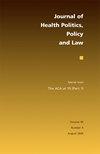The Link between Democratic Institutions and Population Health in the American States.
IF 2.8
3区 医学
Q1 HEALTH CARE SCIENCES & SERVICES
引用次数: 1
Abstract
CONTEXT This project investigates the role of state-level institutions in explaining variation in population health in the American states. Although cross-national research has established the positive effects of democracy on population health, little attention has been given to subnational units. We leverage a new dataset to understand how political accountability and a system of checks and balances are associated with state population health. METHOD We estimate error correction models and two-way fixed effects models to estimate how the strength of state-level democratic institutions are associated with infant mortality rates, life expectancy, and midlife mortality. FINDINGS We find that institutions that promote political accountability are related to lower infant mortality across the states, while those that promote checks and balances are associated with longer life expectancy. We also find that policy liberalism is associated with better health outcomes. CONCLUSIONS Subnational institutions play an important role in population health outcomes and more research is needed to understand the linkage between democracy and health. We are the first to explore the link between democratic institutions and population health within the United States contributing to both the social science literature on the positive effects of democracy and the epidemiological literature on subnational health outcomes.美洲各州民主制度与人口健康之间的联系。
本项目调查州级机构在解释美国各州人口健康变化方面的作用。虽然跨国研究确定了民主对人口健康的积极影响,但很少注意到次国家单位。我们利用一个新的数据集来了解政治问责制和制衡制度如何与州人口健康相关联。方法我们估计误差修正模型和双向固定效应模型,以估计州级民主制度的强度与婴儿死亡率、预期寿命和中年死亡率之间的关系。我们发现,促进政治问责的制度与各州较低的婴儿死亡率有关,而促进制衡的制度与较长的预期寿命有关。我们还发现,政策自由主义与更好的健康结果有关。结论地方机构在人口健康结果中发挥着重要作用,需要更多的研究来了解民主与健康之间的联系。我们率先在美国境内探索民主制度与人口健康之间的联系,为有关民主的积极影响的社会科学文献和有关次国家卫生结果的流行病学文献做出了贡献。
本文章由计算机程序翻译,如有差异,请以英文原文为准。
求助全文
约1分钟内获得全文
求助全文
来源期刊
CiteScore
7.30
自引率
7.10%
发文量
46
审稿时长
>12 weeks
期刊介绍:
A leading journal in its field, and the primary source of communication across the many disciplines it serves, the Journal of Health Politics, Policy and Law focuses on the initiation, formulation, and implementation of health policy and analyzes the relations between government and health—past, present, and future.

 求助内容:
求助内容: 应助结果提醒方式:
应助结果提醒方式:


